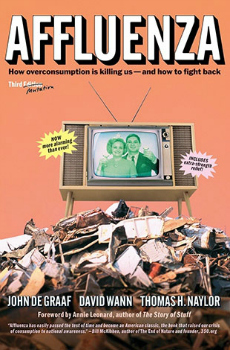 Affluenza: How Overconsumption Is Killing Us — and How To Fight Back by John de Graaf, David Wann, and Thomas N. Naylor draws from two highly praised 1997 PBS documentaries pointing out the severe fallout from affluence. This includes environmental degradation, loneliness, increasing debt, longer working hours, and the purchase of unneeded things.
Affluenza: How Overconsumption Is Killing Us — and How To Fight Back by John de Graaf, David Wann, and Thomas N. Naylor draws from two highly praised 1997 PBS documentaries pointing out the severe fallout from affluence. This includes environmental degradation, loneliness, increasing debt, longer working hours, and the purchase of unneeded things.
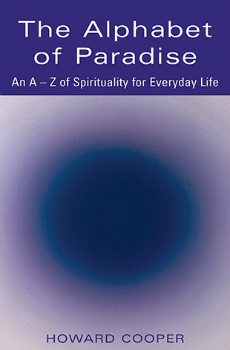 The Alphabet of Paradise: An A-Z of Spirituality for Everyday Life by Howard Cooper observes that any aspect of life can hold a deep spiritual teaching for those who truly look for its meaning. Much of the book's wisdom concerns a simple enjoyment of life that serves us better than acquisition.
The Alphabet of Paradise: An A-Z of Spirituality for Everyday Life by Howard Cooper observes that any aspect of life can hold a deep spiritual teaching for those who truly look for its meaning. Much of the book's wisdom concerns a simple enjoyment of life that serves us better than acquisition.
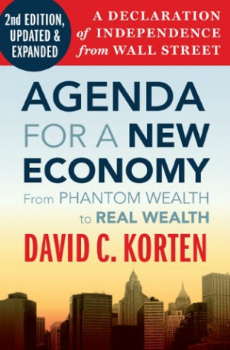 Agenda for a New Economy: From Phantom Wealth to Real Wealth by David C. Korten suggests that in the face of staggering unemployment, consumer debt, housing foreclosures, a shrinking middle-class, and an increasing gap between the rich and the poor, we need to address the deeper structural causes of our financial, social, and environmental crises.
Agenda for a New Economy: From Phantom Wealth to Real Wealth by David C. Korten suggests that in the face of staggering unemployment, consumer debt, housing foreclosures, a shrinking middle-class, and an increasing gap between the rich and the poor, we need to address the deeper structural causes of our financial, social, and environmental crises.
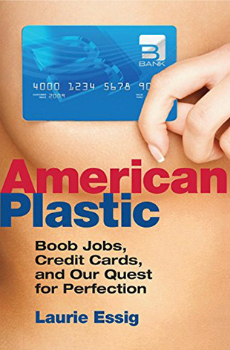 American Plastic: Boob Jobs, Credit Cards, and Our Quest for Perfection by Laurie Essig reveals that Americans have more than 10 million surgical and nonsurgical cosmetic procedures every year, from nose jobs to liposuction. Many believe that looking good is the key to finding and keeping a partner, getting the best job, and feeling good about themselves.
American Plastic: Boob Jobs, Credit Cards, and Our Quest for Perfection by Laurie Essig reveals that Americans have more than 10 million surgical and nonsurgical cosmetic procedures every year, from nose jobs to liposuction. Many believe that looking good is the key to finding and keeping a partner, getting the best job, and feeling good about themselves.
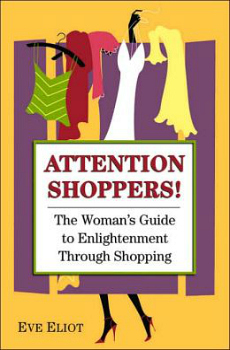 Attention Shoppers!: The Woman's Guide to Enlightenment Through Shopping by Eve Eliot deems shopping to be self-creation and delves into why we shop; for instance, as a ritual with a personal meaning, as a form of self-nurturing, and as a way to transform your life.
Attention Shoppers!: The Woman's Guide to Enlightenment Through Shopping by Eve Eliot deems shopping to be self-creation and delves into why we shop; for instance, as a ritual with a personal meaning, as a form of self-nurturing, and as a way to transform your life.
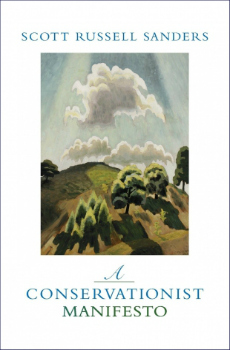 A Conservationist Manifesto by Scott Russel Sanders outlines the practical, ecological, and ethical grounds for a conservation ethic. Sanders suggests that we change our habits and behavior by moving from the "culture of consumption, extravagance, and waste that dominates America today" to more frugal and simple lifestyles.
A Conservationist Manifesto by Scott Russel Sanders outlines the practical, ecological, and ethical grounds for a conservation ethic. Sanders suggests that we change our habits and behavior by moving from the "culture of consumption, extravagance, and waste that dominates America today" to more frugal and simple lifestyles.
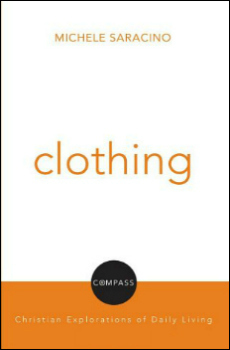 Clothing by Michele Saracino points out that our human vulnerability and neediness renders us very susceptible to the fads of the fashion world and the dictates of cultural tastemakers.But the incarnation, as understood in Christian theology, calls us back to essentials and away from consumer trends and pressures.
Clothing by Michele Saracino points out that our human vulnerability and neediness renders us very susceptible to the fads of the fashion world and the dictates of cultural tastemakers.But the incarnation, as understood in Christian theology, calls us back to essentials and away from consumer trends and pressures.
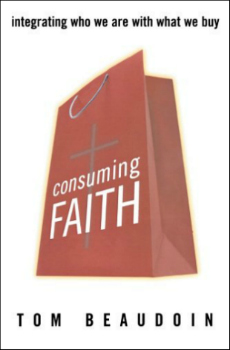 Consuming Faith: Integrating Who We Are with What We Buy by Tom Beaudoin contends that branding can help us see that we are connected to others in far-away places. We must cultivate a mature and responsible economic spirituality based on human dignity and decency.
Consuming Faith: Integrating Who We Are with What We Buy by Tom Beaudoin contends that branding can help us see that we are connected to others in far-away places. We must cultivate a mature and responsible economic spirituality based on human dignity and decency.
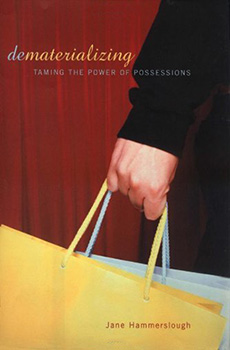 Dematerializing: Taming the Power of Possessions by Jane Hammerslough makes clear that the objects of our desire cannot carry all the burdens we place upon them — to provide security, status, well-being, or to combat our feelings of anxiety or powerlessness. We need another kind of faith that honestly deals with the real suffering, pain, and fear of modern life.
Dematerializing: Taming the Power of Possessions by Jane Hammerslough makes clear that the objects of our desire cannot carry all the burdens we place upon them — to provide security, status, well-being, or to combat our feelings of anxiety or powerlessness. We need another kind of faith that honestly deals with the real suffering, pain, and fear of modern life.
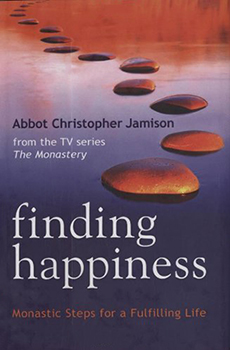 Finding Happiness: Monastic Steps for a Fulfilling Life by Abbot Christopher Jamison ponders the modern yearning for happiness and that certain something that goes beyond pleasure. Based on monastic principles, it suggests a personal recovery program from apathy, gluttony, lust, greed, anger, sadness, vanity, and pride.
Finding Happiness: Monastic Steps for a Fulfilling Life by Abbot Christopher Jamison ponders the modern yearning for happiness and that certain something that goes beyond pleasure. Based on monastic principles, it suggests a personal recovery program from apathy, gluttony, lust, greed, anger, sadness, vanity, and pride.
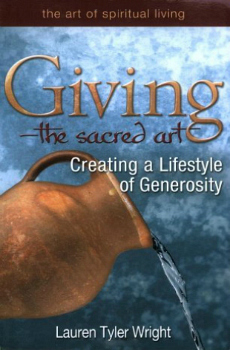 Giving - The Sacred Art: Creating a Lifestyle of Generosity by Lauren Tyler Wright conveys the philosophy of generosity — including topics like providing for others and working towards righteous equity — replete with illustrative material and a toolkit for putting this lifestyle choice into practice.
Giving - The Sacred Art: Creating a Lifestyle of Generosity by Lauren Tyler Wright conveys the philosophy of generosity — including topics like providing for others and working towards righteous equity — replete with illustrative material and a toolkit for putting this lifestyle choice into practice.
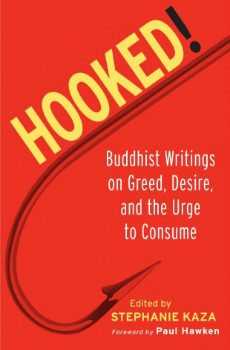 Hooked! Buddhist Writings on Greed, Desire, and the Urge to Consume by Stephanie Kaza (editor) notes that "We are all human. We will always consume. The big question is how." It recommends generosity as a key antidote to excess and contemplation as a way to learn to put others' happiness before our own.
Hooked! Buddhist Writings on Greed, Desire, and the Urge to Consume by Stephanie Kaza (editor) notes that "We are all human. We will always consume. The big question is how." It recommends generosity as a key antidote to excess and contemplation as a way to learn to put others' happiness before our own.
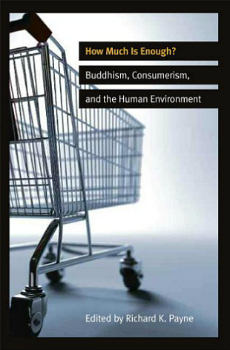 How Much Is Enough? Buddhism, Consumerism, and the Human Environment by Richard K. Bayne (editor) is a scholarly collection of essays from the International Symposium on "Buddhism and the Environment" held in 2003. It critiques consumerism, laments the global consequences of overconsumption, and upholds sustainable living.
How Much Is Enough? Buddhism, Consumerism, and the Human Environment by Richard K. Bayne (editor) is a scholarly collection of essays from the International Symposium on "Buddhism and the Environment" held in 2003. It critiques consumerism, laments the global consequences of overconsumption, and upholds sustainable living.
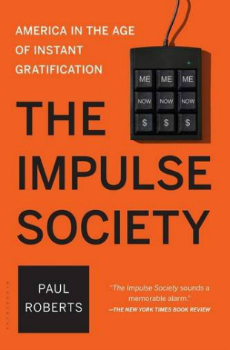 The Impulse Society: America in the Age of Instant Gratification by Paul Roberts calls for a pushback against our hedonistic society, leveraging individual quests for connection into broader politial actions. If you are saddened by the consumer society's emphasis on the short-term gratification of self instead of long-term goals for everyone, this book is for you.
The Impulse Society: America in the Age of Instant Gratification by Paul Roberts calls for a pushback against our hedonistic society, leveraging individual quests for connection into broader politial actions. If you are saddened by the consumer society's emphasis on the short-term gratification of self instead of long-term goals for everyone, this book is for you.
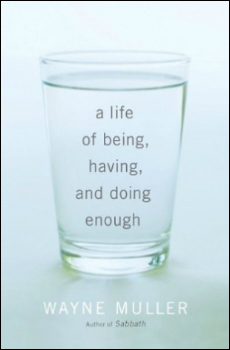 A Life of Being, Having, and Doing Enough by Wayne Muller reflects on how we have forgotten what it feels like to know that we have enough. The author challenges us to listen to our inner thermostat for signs that we have done enough and can take a break or stop altogether.
A Life of Being, Having, and Doing Enough by Wayne Muller reflects on how we have forgotten what it feels like to know that we have enough. The author challenges us to listen to our inner thermostat for signs that we have done enough and can take a break or stop altogether.
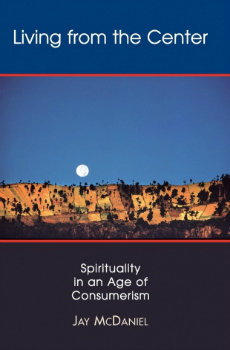 Living from the Center: Spirituality in an Age of Consumerism by Jay McDaniel presents nine ways of knowing God: discernment, sacramental awareness, openness to healing, living-by-dying, trust in open space, deep listening, courage in suffering, creativity, and loving-kindness. These are the building blocks for the abundant life that Jesus talks about in the Gospel of John.
Living from the Center: Spirituality in an Age of Consumerism by Jay McDaniel presents nine ways of knowing God: discernment, sacramental awareness, openness to healing, living-by-dying, trust in open space, deep listening, courage in suffering, creativity, and loving-kindness. These are the building blocks for the abundant life that Jesus talks about in the Gospel of John.
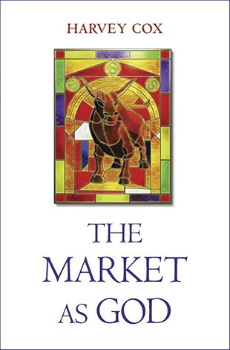 The Market as God by Harvey Cox looks at how the marketplace is co-opting the symbols of Christmas and using them to promote acquisitiveness. "Only time will tell whether the infant in the manger or the gnome in the sleigh will prevail."
The Market as God by Harvey Cox looks at how the marketplace is co-opting the symbols of Christmas and using them to promote acquisitiveness. "Only time will tell whether the infant in the manger or the gnome in the sleigh will prevail."
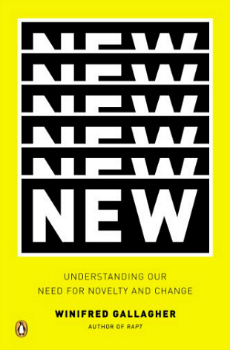 New: Understanding: Our Need for Novelty and Change by Winifred Gallagher explores the complex origins, uses, and excesses of "neophilia" — the need to seek out novelty and change. What we desperately need is more novel ways of stopping all of us from drowning in the tsunami of new data that has upended our lives.
New: Understanding: Our Need for Novelty and Change by Winifred Gallagher explores the complex origins, uses, and excesses of "neophilia" — the need to seek out novelty and change. What we desperately need is more novel ways of stopping all of us from drowning in the tsunami of new data that has upended our lives.
 Promise Ahead: A Vision of Hope and Action for Humanity's Future by Duane Elgin sets down five adversity trends, which demand that human beings grow up: climate change, population growth, poverty, extinction of species, and depletion of fresh water. Antidotes include voluntary simplicity and experiencing the universe as alive.
Promise Ahead: A Vision of Hope and Action for Humanity's Future by Duane Elgin sets down five adversity trends, which demand that human beings grow up: climate change, population growth, poverty, extinction of species, and depletion of fresh water. Antidotes include voluntary simplicity and experiencing the universe as alive.
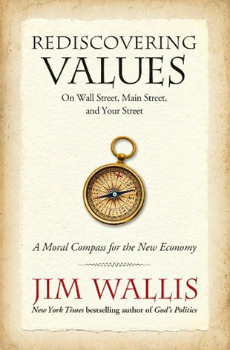 Rediscovering Values on Wall Street, and Your Street: A Moral Compass for the New Economy by Jim Wallis helps us remember some very important things we've forgotten, like stewardship, justice, the Jubilee tradition, the wisdom of the Early Church Fathers, and the importance of caring for the poor.
Rediscovering Values on Wall Street, and Your Street: A Moral Compass for the New Economy by Jim Wallis helps us remember some very important things we've forgotten, like stewardship, justice, the Jubilee tradition, the wisdom of the Early Church Fathers, and the importance of caring for the poor.
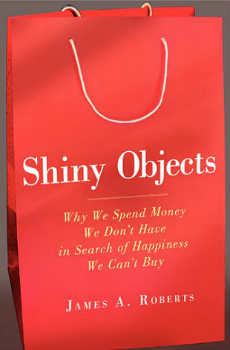 Shiny Objects: Why We Spend Money We Don't Have in Search of Happiness We Can't Buy by James A. Roberts offers a stinging critique of consumerism in America and counters with strategies to combat the troublesome trends of credit-card abuse, compulsive shopping, and spending money that isn’t there.
Shiny Objects: Why We Spend Money We Don't Have in Search of Happiness We Can't Buy by James A. Roberts offers a stinging critique of consumerism in America and counters with strategies to combat the troublesome trends of credit-card abuse, compulsive shopping, and spending money that isn’t there.
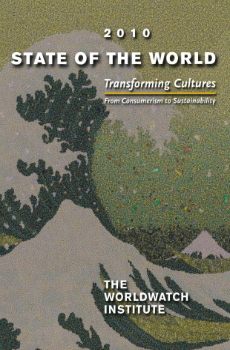 State of the World: Transforming Cultures from Consumerism to Sustainability by the editors at The Worldwatch Institute considers how countries can transform consumer cultures into sustainable cultures. Articles deliver a multidimensional survey of ways in which leading institutions and social movements offer a new cultural paradigm.
State of the World: Transforming Cultures from Consumerism to Sustainability by the editors at The Worldwatch Institute considers how countries can transform consumer cultures into sustainable cultures. Articles deliver a multidimensional survey of ways in which leading institutions and social movements offer a new cultural paradigm.
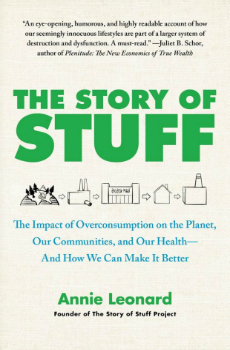 The Story of Stuff: The Impact of Overconsumption on the Planet, Our Communities, and Our Health — And How We Can Make It Better by Annie Leonard ranges far and wide in a discussion of superstores, overconsumption, planned obsolescence of products, the relentless advertising to children, electronic waste, and recycling.
The Story of Stuff: The Impact of Overconsumption on the Planet, Our Communities, and Our Health — And How We Can Make It Better by Annie Leonard ranges far and wide in a discussion of superstores, overconsumption, planned obsolescence of products, the relentless advertising to children, electronic waste, and recycling.
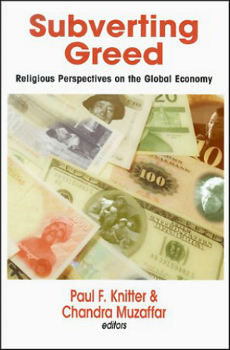 Subverting Greed: Religious Perspectives on the Global Economy by Paul F. Knitter and Chandra Muzaffar (editors) acknowledges that the world's religions may not be united on various ideas and principles but they all share an interest in helping the poor and the powerless who are suffering as a result of economic despair.
Subverting Greed: Religious Perspectives on the Global Economy by Paul F. Knitter and Chandra Muzaffar (editors) acknowledges that the world's religions may not be united on various ideas and principles but they all share an interest in helping the poor and the powerless who are suffering as a result of economic despair.
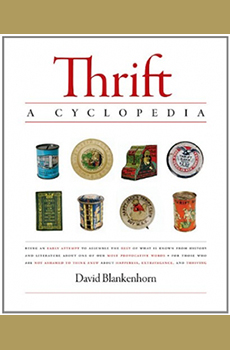 Thrift: A Cyclopedia by David Blankenhorn gives a timely overview of this virtue which encompasses the ideals of hard work, financial prudence, and generosity. Blankenhorn has gathered hundreds of quotations, sayings, proverbs, and photographs from the past when thrift was regarded as a highly esteemed cultural value.
Thrift: A Cyclopedia by David Blankenhorn gives a timely overview of this virtue which encompasses the ideals of hard work, financial prudence, and generosity. Blankenhorn has gathered hundreds of quotations, sayings, proverbs, and photographs from the past when thrift was regarded as a highly esteemed cultural value.
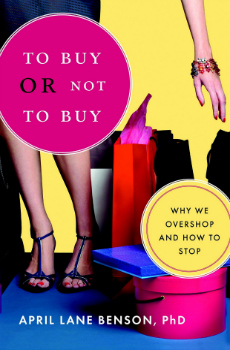 To Buy or Not To Buy: Why We Overshop and How to Stop by April Lane Benson is an accessible and thorough interactive guidebook to the problem of compulsive shopping. It contains an overview of this addiction and a large cross-cut of tips, tools, techniques, and strategies for dealing with it.
To Buy or Not To Buy: Why We Overshop and How to Stop by April Lane Benson is an accessible and thorough interactive guidebook to the problem of compulsive shopping. It contains an overview of this addiction and a large cross-cut of tips, tools, techniques, and strategies for dealing with it.
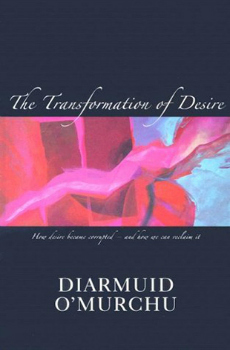 The Transformation of Desire: How Desire Became Corrupted and How We Can Reclaim It by Diarmuid O' Murchu honors the spiritual practice of yearning and challenges us to see that it is inescapable, full of ambiguity, part of a subconscious process, and remains "a gift to be embraced rather than a malady to be gotten rid of."
The Transformation of Desire: How Desire Became Corrupted and How We Can Reclaim It by Diarmuid O' Murchu honors the spiritual practice of yearning and challenges us to see that it is inescapable, full of ambiguity, part of a subconscious process, and remains "a gift to be embraced rather than a malady to be gotten rid of."
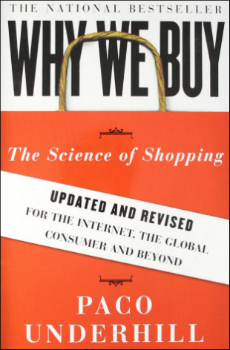 Why We Buy: The Science of Shopping — Updated and Revised for the Internet, the Global Consumer. and Beyond by Paco Underhill shares fascinating tidbits on the popular experience of shopping while probing its mechanics, demographics, dynamics, and culture.
Why We Buy: The Science of Shopping — Updated and Revised for the Internet, the Global Consumer. and Beyond by Paco Underhill shares fascinating tidbits on the popular experience of shopping while probing its mechanics, demographics, dynamics, and culture.
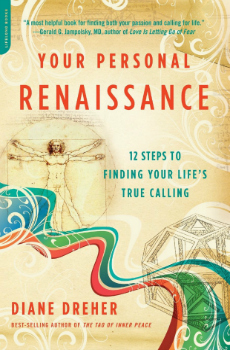 Your Personal Renaissance: 12 Steps to Finding Your True Life's Calling by Diane Dreher approaches consumerism indirectly by exploring the elements of fulfillment: realizing your joys and talents, becoming healthily detached, discerning your values, and turning your ideals into action.
Your Personal Renaissance: 12 Steps to Finding Your True Life's Calling by Diane Dreher approaches consumerism indirectly by exploring the elements of fulfillment: realizing your joys and talents, becoming healthily detached, discerning your values, and turning your ideals into action.
